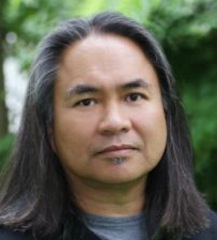Liner Notes For Monk
April 26, 2016“Monk’s Mood” [false start] I had gotten off the bus too soon for my stop and so I had to walk a few blocks in order to gain my bearings….
“Monk’s Mood” [false start]
I had gotten off the bus too soon for my stop and so I had to walk a few blocks in order to gain my bearings. Thelonious Monk said, “It’s always night/ or we wouldn’t need light.” I read this in an essay. I wanted to have a conversation with someone to lighten my load. I remember seeing a woman disembarking from the next bus. Our gazes locked for a long second. [It is always night wherever you go.]
“Crepuscule with Nellie” [breakdown]
[Monk continues alone and quiet.] Northward leads to the river southward back to my hotel room. An entire week had passed and I hadn’t exchanged seven words with another human. The sound of words directed at me felt like a hand on my shoulder, an arm brushing against my skin. It is always night when silence overcomes me, silence opening up within me like a wound. Black keys, I’ve been told, have an ominous, mysterious sound.
“Misterioso”
[Monk conversing with water.] What we end up making, whether it’s something we do by ourselves or with others is always a form of conversation. My presence is solid, but others see me as a fishing weir, a foamless Mister So-and-So, a scavenger for anything that would flatter his eyes. What I want is a garden that will not perish, a bed of imperial white peonies.
—Eugene Gloria (Putnam County)
This poem first appeared in Tongue and was reprinted in The Best American Poetry: 2014.

Eugene Gloria is the author of My Favorite Warlord (Penguin, 2012), Hoodlum Birds (Penguin, 2006), and Drivers at the Short-Time Motel (Penguin, 2000). His honors include an Anisfield-Wolf Book Award, Pushcart Prize, and a National Poetry Series selection. His recent work appears or is forthcoming in American Poetry Review, TriQuarterly, Memorious, Prairie Schooner, Ploughshares, and The Best American Poetry: 2014.
Poetry Prompt: Conversing with a Musical Work
Create a poem that converses with a favorite musical composition or song. Play this music as you write and let elements of its style affect your poem’s form, atmosphere, pacing, etc. You might want to bring the composer into the poem or a personal memory that is somehow connected to this work.
Indiana Humanities is celebrating National Poetry Month by sharing a poem and prompt every day in April. Indiana Poet Laureate Shari Wagner selected these poems and wrote the prompts.


